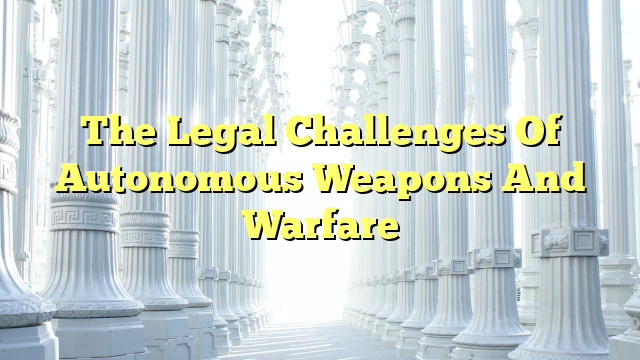The Legal Challenges of Autonomous Weapons and Warfare
Table of Contents
- What are the problems with autonomous weapons?
- What are the challenges in regulating lethal autonomous weapons under international law?
- What are the arguments against autonomous weapons?
- Are autonomous weapon systems legal?
What are the problems with autonomous weapons?
Autonomous weapons systems have the potential to revolutionize warfare, but also raise a number of legal and moral issues. Autonomous systems are defined as weapon systems that, once activated, can select and engage targets without further human intervention. This raises the possibility of unprecedented levels of autonomy, with human beings removed from the decision-making process. This could lead to decisions being made without the benefit of human judgment, empathy, and morality.
Another problem is that autonomous weapon systems could create unprecedented levels of destruction if they were to malfunction or be hacked. This could lead to large-scale destruction and loss of civilian life. Additionally, if these systems are not sufficiently regulated, they could be used illegally by rogue states or terrorist organizations, leading to even more destruction.
Finally, due to the potential for autonomous weapons systems to be used without human intervention, it is difficult to hold individuals criminally responsible for the actions of these systems. This could lead to a situation where individuals are not held accountable for the destruction caused by these weapons, leading to a breakdown of the rule of law.
What are the challenges in regulating lethal autonomous weapons under international law?
The primary challenge in regulating lethal autonomous weapon systems is the difficulty in determining what constitutes “human control” over the weapon system. International law requires that an individual must have “effective control” over a weapon system in order for them to be held accountable for its actions. However, it is difficult to determine what is considered “effective control” when it comes to autonomous weapon systems.
Furthermore, it is difficult to determine the legal responsibility that individuals would bear for the actions of autonomous weapons systems. As autonomous weapons systems are not controlled by a single individual, it is unclear who would be held accountable for any destruction that they may cause. This could lead to a situation where individuals are not held accountable for the destruction caused by these weapons, leading to a breakdown of the rule of law.
Finally, due to the rapid advancements in artificial intelligence and autonomous weapon systems, it is becoming increasingly difficult to keep up with the latest developments in the field. This could lead to situations where outdated laws are used to regulate the use of these weapons, which could lead to them being used illegally.
What are the arguments against autonomous weapons?
One of the primary arguments against autonomous weapons is that they could lead to unprecedented levels of destruction and civilian casualties. Autonomous weapons systems have the potential to make decisions faster than a human could, and could lead to decisions being made without the benefit of human judgment, empathy, and morality. This could lead to large-scale destruction and loss of civilian life.
Additionally, autonomous weapons systems could be used to commit war crimes without the knowledge or consent of their users. This could lead to situations where individuals are not held accountable for the destruction caused by these weapons, leading to a breakdown of the rule of law.
Finally, some experts argue that autonomous weapons systems could lead to a destabilization of the international system. This could occur as autonomous weapons systems could be used by both states and non-state actors, leading to an arms race as states attempt to outmatch each other with increasingly sophisticated technology.
Are autonomous weapon systems legal?
The legality of autonomous weapons systems is unclear. The United Nations has released a set of guiding principles for the use of autonomous weapons systems, but these are not legally binding. Additionally, the lack of clear definitions and regulations surrounding autonomous weapons systems makes it difficult to determine what constitutes legal use of these weapons.
Furthermore, as autonomous weapons systems are not controlled by a single individual, it is difficult to determine who should be held accountable for any destruction that they may cause. This could lead to a situation where individuals are not held accountable for the destruction caused by these weapons, leading to a breakdown of the rule of law.
In conclusion, the use of autonomous weapons systems is a complex legal issue,


Autonomous weapons present a complex legal landscape that must be carefully navigated.